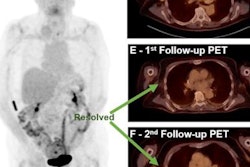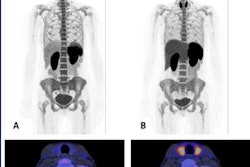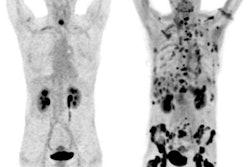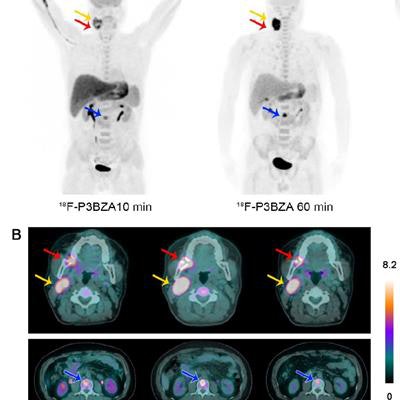
A new PET tracer designed to target melanin pigment could improve the detection of both primary and metastatic melanoma, according to a study published in the January issue of the Journal of Nuclear Medicine.
Chinese and U.S. researchers tested N-(2-(diethylamino)-ethyl)-F-18-5-fluoropicolinamide (F-18 P3BZA) in humans and found that the tracer can affect melanoma behavior and subsequently the outcome of a patient's radiotherapy (JNM, January 2019, Vol. 60:1, pp. 16-22).
"While melanin-targeted PET probes have been studied in small animal models for a long time, this is the first time such a probe has been successfully translated into clinical evaluation," said study co-author Zhen Cheng, PhD, from Stanford University in a statement. "Our research shows that F-18 P3BZA is safe and, moreover, it is highly promising for clinical diagnosis and staging of melanoma."
Being able to attack melanin is particularly important because its production shortens both overall and disease-free survival in patients with metastatic melanoma.
For the study, six healthy individuals were injected with F-18 P3BZA. The subjects then underwent whole-body PET/CT scans and blood tests to assess biodistribution, pharmacokinetic, and radiation dosimetry at 10 minutes, 60 minutes, 120 minutes, and four hours after injection. In addition, five patients with suspected melanoma were given F-18 P3BZA prior to their whole-body PET/CT scans 10 minutes and 60 minutes after injection. To compare diagnostic ability, all subjects also underwent FDG-PET/CT scans on the third day.
The results showed that F-18 P3BZA was well-tolerated and clearly delineates melanoma tumors.
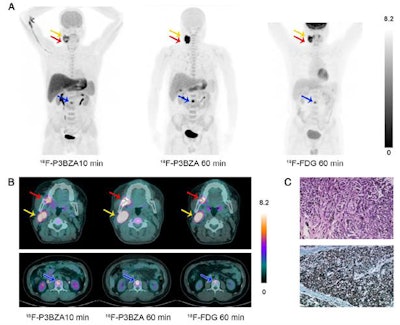 PET images from a melanoma patient. Maximum-intensity projection (A) at 10 and 60 minutes after F-18 P3BZA injection and at 60 minutes after F-18 FDG injection. Transverse images (B) of primary melanoma (red arrow), lymph node metastasis (yellow arrow), and bone metastasis (blue arrow). Hematoxylin and eosin (C, upper) and immunohistochemistry (C, lower) images of primary melanoma. Images courtesy of Ma et al and JNM.
PET images from a melanoma patient. Maximum-intensity projection (A) at 10 and 60 minutes after F-18 P3BZA injection and at 60 minutes after F-18 FDG injection. Transverse images (B) of primary melanoma (red arrow), lymph node metastasis (yellow arrow), and bone metastasis (blue arrow). Hematoxylin and eosin (C, upper) and immunohistochemistry (C, lower) images of primary melanoma. Images courtesy of Ma et al and JNM."Given its specific melanoma-imaging capability, F-18 P3BZA is expected to be a new probe which may overcome some of the limitations of F-18 FDG, such as the false positive of inflammation and a substantially lower tumor-to-muscle contrast compared with F-18 P3BZA," Cheng said. "Therefore, F-18 P3BZA may improve melanoma and metastasis detection and help guide therapeutic planning for melanoma patients."





